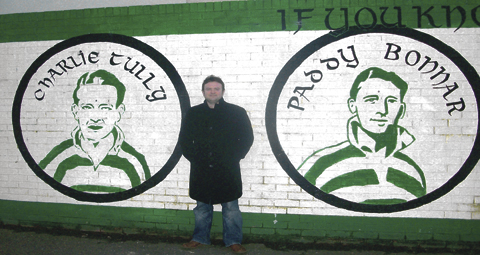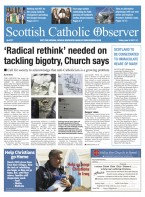July 13 | ![]() 0 COMMENTS
0 COMMENTS ![]() print
print

Locked into a Belfast state of mind
— RICHARD PURDEN recounts his recent meeting with Scottish playwright Des Dillon in Belfast and explains how theatre goers there found a common humanity in one of the writer’s works
Earlier this year Des Dillon invited me over to Belfast to see his anti-sectarian play Singing I’m No A Billy He’s A Tim at The Lyric theatre. Prior to meeting Des I stopped off at Fáilte restaurant, which proved to be a welcome stop off point for any hungry traveller. A friendly environment, it is of particular interest to football fans as it is part owned by former Celtic FC and current Aberdeen FC player Niall McGinn. Various mementoes of his career grace the walls as well as other well known figures who have visited the popular restaurant. The soups and sandwiches are ideal if you are on a whistle stop tour around the city.
I met Des outside Belfast City Hall with the cast and crew. At the front of the fleet in the city centre our taxi driver, Big E, invited all six of us into his cab to take a tour of the city. It was fascinating to travel with supporters of both Celtic and Rangers in the black taxi tour around west Belfast and its communities where the banter warmed up a particularly cold morning. As soon as the door was closed Big E asked us to guess his religious background, which he would tell us at the end of the tour. But it was already too late; a name badge reading Eamonn had already given the game away.
Big E’s journey began without prejudice on the Shankhill Road. The murals on what looks like an ordinary council estate are the only indication of the area’s history. Des was typically philosophical when he told me: “It was a big experience for me. Standing at the UDA murals I felt that these guys on the wall were ordinary men in extraordinary circumstances. A loyalist known as ‘Top Gun’ looked like a guy who you might spot on a bench press at the gym. I did not feel any hate nor fear but instead a strange affinity. I long ago realised that, in Scotland at least, we are one tradition or cultural edifice, namely: Ulster Sectarianism. I call it Ulsterism. Uniquely, Ulsterism was brought as a whole to Scotland and in Coatbridge, as a boy, I realised one side could not exist without the other. I have always presumed that boxers hug after a bout because they’re both boxers.”
Our next stop was the renowned peace walls that stretch out over a haunting wasteland that stretches 13 miles. Dividing the two communities; the murals feature a variety of political struggles around the world as well as references to its next of kin, the Berlin Wall. Although built in 1969 as a short term solution the walls remain in operation even now. Once through the gates we quickly arrive at the Falls Road Garden of Remembrance. The first houses we arrive at are bomb proofed, outside a back garden trampoline suggests the inhabitant’s determination to lead a normal in spite of the past. Eamonn tells us that the sense of community remains strong and those houses continue to be sought after in the area. For Des the list of names brought back a flood of memories from his own past growing up Lanarkshire; their meaning seemed to take on a new context.
“The Memorial Garden was like my old school register,” he said. “I knew a Burns and a Lavery, a Mooney, a Dempsey and a Grace. McGuire, Monahan, Canavan, Fox; I put a face to every surname on that wall, even the most obscure like Hannaway were big names in Coatbridge. So as the faces of my past flashed one at a time, each with their stories and grins, I got emotional.”
One of the pubs on Falls Road, The Rebel’s Rest, is perhaps a sign that politics in Ireland has moved on. When local bars reference the conflict as pop culture honey for the masses, it is more likely you are going to find tourists resting in the bar instead of paramilitaries. The street names, political figures on the murals and the names all have an uncanny familiarity. Perhaps it is from news programmes, documentaries or songs. Or maybe Des is right; there is something that echoes all of our own lives back in Scotland.
Perhaps the most familiar murals are those relating to Celtic; not the Glasgow one but its Belfast counterpart which was forced to withdraw from the professional game in 1949 amid sectarian tensions. Their Celtic Park is now sadly a shoppinmg centre but at least the murals remain. That very creativity continues to evoke something of the human condition and emotions from the people that lived through Ireland’s troubled past. For Des in particular the murals resonated deep within.
“I did not expect to get emotional when we reached the murals on Falls Road, but I did,” he said. “I’d only ever seen them on the telly yet those images were inside me like the tentacles of a family tree. I turned to the wall to hide my tears but the dull pain in my chest and belly was like re-ignited grief at an old friend’s grave. But what right do I have to these emotions in a city that isn’t mine? Here’s what—Ireland isn’t a place; it’s a state of mind. And I grew up in Ireland as sure as Bobby Sands did.”
Inspired by his experience the playwright wrote the peace walls experience into Billy and Tim for the Belfast audience that night. While the play continues to be one of the most popular and performed plays in Scotland of the last five years, he had pondered if the work would translate in the still healing city of Belfast. Undoubtedly the writer was released from tenterhooks by the audience’s cathartic joy and tears.
“This old Belfast woman, don’t know which side she was from, said to me after the event; ‘so you’re not from Belfast?” he said. “‘So how did you come to write this?’ She obviously wondered how a Scotsman could move the Belfast people to tears and get the explosive laughter of self-recognition, yet not be one of them.”
Amid an overwhelming sense of good-will, a standing ovation and a thunderous applause; it didn’t matter who was Scottish or Irish, Nationalist or Unionist, Catholic or Protestant or even Celtic or Rangers. In a Belfast theatre people had found a common humanity despite their differences and in that atmosphere Des Dillon was undoubtedly one of them.











